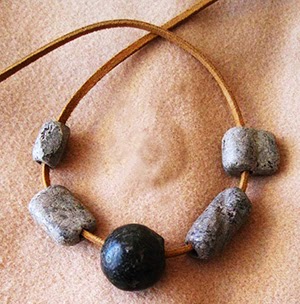Maple Sugaring has been a tradition in New England for centuries that heralds the first glimpse of spring. This tradition was practiced long before the colonists arrived by Native Americans, who in fact where the first people to tap the sugar maple in order to make sugar. The gathering of sap and production of maple sugar is an important event in the annual lifecycle of Native Americans. It is a time when large extended families would gather at Sugar Maple plots to share in the work of making maple sugar.
On March 14 from 11 a.m. to 3 p.m. at the Institute for American Indian Studies on 38 Curtis Road in Washington Connecticut, there will be a maple sugaring demonstration by Jeff and Judy Kalin of Primitive Technologies. The Kalins will demonstrate several traditional techniques of collecting sap and boiling it down into sugar. This maple sugar celebration, collection and boiling down process will take place in the newly restored 16th century replicated Algonquian Village. Visitors will listen to traditional Native American stories of the ways the sap was collected and how important the seasonal gift of maple sap is to the Native American community.
"We want visitors to the Institute to understand how Native people learned to transform the sap from a tree into sugar," explains Jeff Kalin. "We will be demonstrating the traditional techniques of collecting and evaporating this sap using a variety of tools and containers. Hot stones pulled from the fire will be used to evaporate the sap from wood containers, which alone would not have been able to withstand the direct fire." Kalin will explain how water is evaporated from sap using simple techniques and items made and collected from the forest, which is key to how Native Americans made maple sugar traditionally. Visitors will also learn about the importance of how understanding seasonality and their environment, made it possible for local inhabitants to use the sap from the maple tree to provide an annual supply of sugar for their use or trade among the Native American communities and colonists.
An added sweet bonus of this event is the “made from scratch” pancakes served up with local maple sugar, coffee, and orange juice. The Maple Sugar Demonstration is noon – 3 pm., the Pancake Brunch is 11 am – 2 p.m., and children’s activities are 11:30 a.m. – 2:30 pm. The cost is $10 for adults, $8 for seniors, children are $6, and members are free. The pancake breakfast is an additional $5.
About The Institute for American Indian Studies
Located on 15 acres of woodland acres the Institute For American Indian Studies preserves and educates through archeology, research, exhibitions, and programs. They have a 16th c. Algonquian Village, Award-Winning Wigwam Escape, and a museum with temporary and permanent displays of authentic artifacts from prehistory to the present that allows visitors to foster a new understanding of the world and the history and culture of Native Americans. The Institute for American Indian Studies is located on 38 Curtis Road, Washington, CT.




